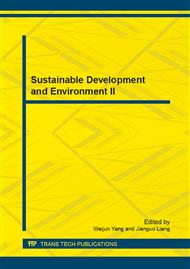[1]
C.L. Chen, Promoting leisure agricultural development. Taipei, Taiwan: National policy Foundation (2002).
Google Scholar
[2]
C.H. Chen, Exploring key success factors of leisure farm: A case study of San-Hao rice leisure farm. Unpublished Master's Thesis, National Kaohsiung University of Hospitality and Tourism, Taiwan (2011).
Google Scholar
[3]
H.C. Lin, H.L. Chiu, and Y.S. Jeng, The study on environmental protection behaviors among pension owners in Hualien. 2008 5th Prospective Study and development of township tourism industry Conference. Taipei, Taiwan, (2008), pp.45-52.
Google Scholar
[4]
Z. Wang, P.Y. Ma, and J.Y. Yang, The construction of environment protection in industry. Theoretical Exploration, 1(2010), pp.139-141.
Google Scholar
[5]
T. F Sung, and S.K. Kao, The influence mechanism of pro-environmental behavior of Taiwanese people. Review of Agricultural Extension Science, 22 (2007), pp.37-80.
Google Scholar
[6]
S.C. Lin, W.H. Chang, M.H. Yu, and C.Y. Tsai, What environmental management practices appeal B & B consumers most? Journal of Rural Tourism Research, 6(1) (2012), pp.57-70.
Google Scholar
[7]
A.P. Sia, H.R. Hungerford, and A.N. Tomera, Selected predictors of responsible environmental behavior: An analysis. The Journal of Environmental Education, 17(2) (1985), pp.31-40.
DOI: 10.1080/00958964.1986.9941408
Google Scholar
[8]
H.R. Hungerford, and T.L. Volk, Changing learner behavior through the environmental education. The Journal of Environmental Education, 21(3) (1990), pp.8-21.
DOI: 10.1080/00958964.1990.10753743
Google Scholar
[9]
H.J. Kim, D. Gursoy, and S.B. Lee, The impact of the 2002 World Cup on South Korea: comparisons of pre- and post-games. Tourism Management, 27, (1) (2006), pp.86-96.
DOI: 10.1016/j.tourman.2004.07.010
Google Scholar
[10]
T.J. Marcinkowski, An analysis of correlates and predictors of responsible environmental behavior. Ph.D. Dissertation, Southern Illinois University at Carbondale (1988).
Google Scholar
[11]
F. Kaiser, G. Doka, P. Hofstetter, and M.A. Ranney, Ecological behavior and its environmental consequences: A life cycle assessment of a self-report measure. Journal of environmental psychology, 23(2003), pp.11-20.
DOI: 10.1016/s0272-4944(02)00075-0
Google Scholar
[12]
L. Shichao, Recycling behavior under china's social and economic transition: The case of metropolitan Wuhan. Environment and Behavior, 35(6) (2003), pp.784-801.
DOI: 10.1177/0013916503254819
Google Scholar
[13]
M.A. Rocco, and V. Andrew, Hospitality today: An introduction. Michigan: Educational Institute (2007).
Google Scholar
[14]
S. Pike, and C. Ryan, Destination positioning analysis through a comparison of cognitive, affective, and conative perceptions. Journal of Travel Research, 42(2) (2004), pp.333-342.
DOI: 10.1177/0047287504263029
Google Scholar
[15]
C.C. Yu, Factors that influence international fans' intention to travel to the united states for sport tourism. Journal of Sport & Tourism, 15(2) (2010), pp.111-137.
DOI: 10.1080/14775085.2010.498249
Google Scholar
[16]
T. Lam, and C.H. Hsu, Predicting behavioral intention of choosing a travel destination. Tourism Management, 27(4) (2006), pp.589-599.
DOI: 10.1016/j.tourman.2005.02.003
Google Scholar
[17]
M. Fishbein, and I. Ajzen, Belief, attitude, intention, and behavior: An introduction to theory and research reading. Mass: Addison-Wesley Publishing Company (1975).
Google Scholar
[18]
G. Bohlen, B.B. Schlegelmilch, and A. Diamantopoulos, Measuring ecological concern: a multi-construct perspective. Journal of Marketing Management, 9(1993), pp.415-430.
DOI: 10.1080/0267257x.1993.9964250
Google Scholar


